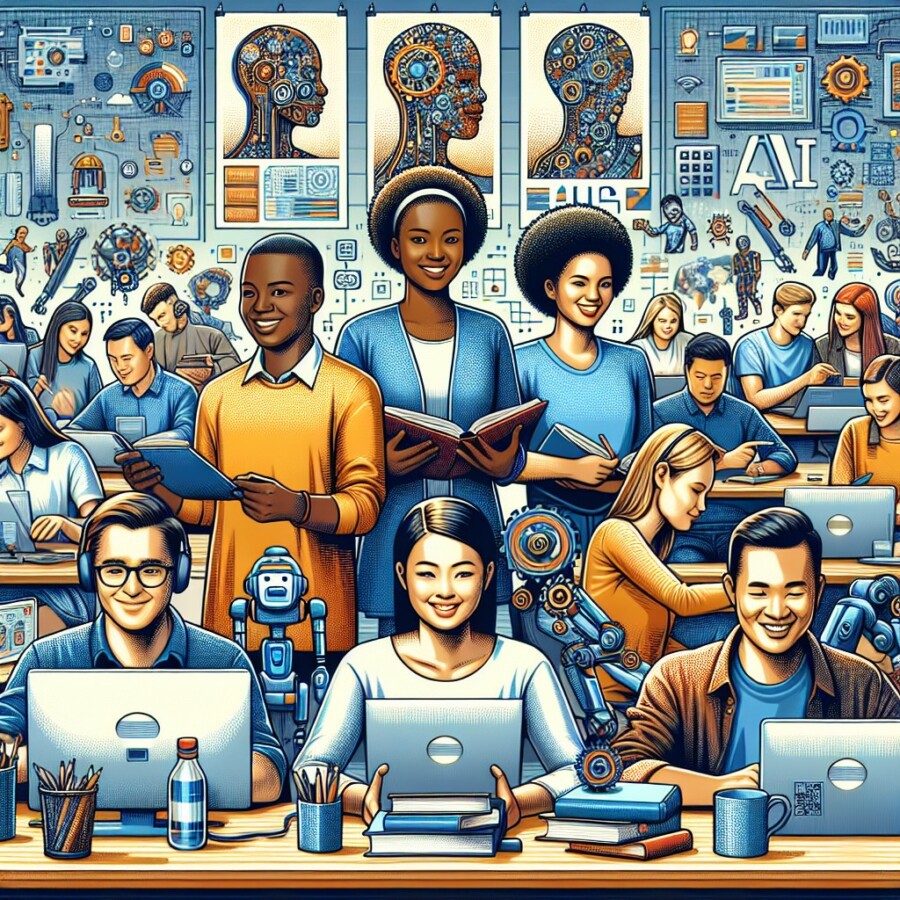A recent analysis by the International Monetary Fund (IMF) found that artificial intelligence (AI) could affect almost 40% of all jobs. The head of the IMF, Kristalina Georgieva, said that AI might make inequality worse in most cases. She stressed the importance of policymakers taking action to prevent this technology from making social tensions worse. The IMF report showed that AI will have a bigger impact on jobs in advanced countries, with about 60% of jobs being affected. Some workers might benefit from AI and become more productive, but others might lose their jobs or get paid less. In poorer countries, AI is predicted to affect only 26% of jobs. However, these countries might struggle because they don’t have the right infrastructure or skilled workers.
The IMF analysis also showed that AI could affect different groups of workers in different ways. People who earn more money and are younger might see their wages go up a lot when they start using AI. On the other hand, people who earn less money and are older might fall behind. To deal with this, the IMF suggests that countries should create safety nets and offer training programs for workers who might be at risk. This way, the transition to AI can be fairer and protect people’s jobs.
The discussion about AI has been getting more attention, with important business and political leaders meeting at the World Economic Forum in Switzerland. Many countries are also starting to make rules about AI. The European Union recently made a deal to have laws that control how AI is used. China has already made its own rules about AI, and the United States has a new rule that says developers have to share information about how safe their AI is with the government. These efforts are meant to make sure that AI is developed and used in a safe and responsible way.
In conclusion, the IMF’s analysis shows that AI will have a big impact on jobs and could make inequality worse. Policymakers need to take action to protect workers and make sure everyone is included. Countries around the world are also starting to make rules about AI to make sure it is used safely.
Original news source: AI to hit 40% of jobs and worsen inequality, IMF says (BBC)
🎧 Listen:
Slow
Normal
Fast
📖 Vocabulary:
| 1 | analysis | A detailed examination or study of something to understand it better |
| 2 | artificial | Made or produced by human beings rather than occurring naturally |
| 3 | inequality | The state of not being equal, especially in status or opportunities |
| 4 | policymakers | People who make laws, rules, or policies |
| 5 | infrastructure | The basic physical systems of a community or country, like roads and bridges |
| 6 | productive | Being able to produce a lot or achieve a lot |
| 7 | transition | The process of changing from one state or condition to another |
| 8 | wages | The money that a person earns from working |
| 9 | safety nets | Things like programs or funds that help to provide security and support |
| 10 | training programs | Courses designed to teach people new skills or improve their abilities |
| 11 | attention | The act of focusing on or giving special importance to something |
| 12 | political | Related to the government or public affairs of a country |
| 13 | developers | People who create new products or systems |
| 14 | responsible | Having an obligation to do something, or having control over or care for someone |
| 15 | included | Being part of a group or included in something |
Group or Classroom Activities
Warm-up Activities:
– News Summary
Instructions: Divide the students into pairs or small groups. Have each group read the article and then summarize the main points in a news-style summary. They should focus on key information and important details. After they have finished, have each group present their summary to the class.
– Opinion Poll
Instructions: Create a list of statements related to the article, such as “AI will create more job opportunities” or “AI will increase income inequality.” Have the students walk around the room and ask their classmates for their opinions on each statement. They should record the responses and then analyze the data to see the overall trends and opinions of the class.
– Word Association
Instructions: Provide the students with a list of words related to the article, such as “artificial intelligence,” “jobs,” “inequality,” “technology,” etc. Have the students take turns saying a word from the list and then quickly saying the first word that comes to their mind. Encourage them to make connections between the words and discuss the reasons behind their associations.
– Sketch It
Instructions: Divide the students into pairs. One student will describe a scene or concept related to the article, while the other student tries to sketch it based on the description. After a set amount of time, have the pairs switch roles. Once both students have had a chance to describe and sketch, have them compare their drawings and discuss any differences or challenges they faced.
– Pros and Cons
Instructions: Divide the students into two groups. One group will brainstorm the pros of AI and its impact on jobs, while the other group will brainstorm the cons. Give the groups a set amount of time to come up with as many points as possible. Then, have each group present their points to the class. Encourage a class discussion about the different perspectives and the overall implications of AI on jobs and inequality.
🤔 Comprehension Questions:
1. According to the IMF, how many jobs could be affected by artificial intelligence?
2. Why does the head of the IMF believe that AI could make inequality worse?
3. How might AI impact jobs in advanced countries compared to poorer countries?
4. Who is more likely to benefit from AI in terms of wages: people who earn more money or people who earn less money?
5. What does the IMF suggest countries do to protect workers who are at risk of losing their jobs to AI?
6. Where did important business and political leaders recently meet to discuss AI?
7. What recent actions have the European Union, China, and the United States taken regarding AI?
8. What is the main conclusion of the IMF’s analysis on AI and jobs?
Go to answers ⇩
🎧✍️ Listen and Fill in the Gaps:
A recent analysis by the International Monetary Fund (IMF) found that artificial intelligence (AI) could affect almost 40% of all jobs. The head of the IMF, Kristalina Georgieva, said that AI might make inequality worse in most cases. She stressed the (1)______ of policymakers taking (2)______ to prevent this technology from making social tensions worse. The IMF report (3)______ that AI will have a bigger impact on jobs in advanced (4)______, with about 60% of jobs being affected. Some workers might benefit from AI and become more productive, but (5)______s might lose their jobs or get paid less. In poorer countries, AI is predicted to affect only 26% of jobs. However, these countries might struggle because they don’t have the (6)______ infrastructure or skilled workers.
The IMF analysis also showed that AI could affect (7)______ groups of workers in different ways. People who earn more money and are younger might see their wages go up a lot when they (8)______ using AI. On the other hand, people who earn less money and are older might fall behind. To deal with this, the IMF suggests that countries should create (9)______ nets and offer (10)______ programs for workers who might be at risk. This way, the transition to AI can be fairer and protect people’s jobs.
The discussion about AI has been getting more attention, with (11)______ business and political leaders meeting at the (12)______ Economic Forum in Switzerland. Many countries are also starting to make rules about AI. The European Union recently made a deal to have laws that control how AI is used. China has already made its own rules about AI, and the United States has a new rule that says (13)______ have to share information about how safe their AI is with the government. These (14)______ are meant to make sure that AI is developed and used in a safe and responsible way.
In conclusion, the IMF’s (15)______ shows that AI will have a big impact on jobs and could make (16)______ worse. Policymakers need to take action to protect workers and make sure everyone is included. Countries around the world are also starting to make rules about AI to make sure it is used safely.
Go to answers ⇩
💬 Discussion Questions:
Students can ask a partner these questions, or discuss them as a group.
1. What is artificial intelligence (AI) and how do you think it will affect our lives in the future?
2. How would you feel if you lost your job because of AI? Why?
3. Do you think AI will make social inequality worse? Why or why not?
4. What do you think policymakers can do to prevent AI from making social tensions worse?
5. How do you think AI will impact jobs in advanced countries compared to poorer countries? Why?
6. Do you think AI will make some workers more productive and others less productive? Why or why not?
7. How do you think AI will affect wages for people who earn more money and those who earn less money? Why?
8. How can countries create safety nets and training programs to protect workers who might be at risk because of AI?
9. Why do you think the discussion about AI has been getting more attention recently?
10. Do you think it is important for countries to have laws that control how AI is used? Why or why not?
11. How do you think AI can be developed and used in a safe and responsible way?
12. What are some potential benefits of AI in our daily lives?
13. Do you think AI will replace human workers completely in the future? Why or why not?
14. How do you think AI will impact the economy of different countries? Why?
15. What do you think the future of AI looks like?
Individual Activities
📖💭 Vocabulary Meanings:
Match each word to its meaning.
Words:
1. analysis
2. artificial
3. inequality
4. policymakers
5. infrastructure
6. productive
7. transition
8. wages
9. safety nets
10. training programs
11. attention
12. political
13. developers
14. responsible
15. included
Meanings:
(A) The process of changing from one state or condition to another
(B) Being part of a group or included in something
(C) Related to the government or public affairs of a country
(D) The money that a person earns from working
(E) Having an obligation to do something, or having control over or care for someone
(F) Being able to produce a lot or achieve a lot
(G) The basic physical systems of a community or country, like roads and bridges
(H) Made or produced by human beings rather than occurring naturally
(I) The state of not being equal, especially in status or opportunities
(J) People who make laws, rules, or policies
(K) The act of focusing on or giving special importance to something
(L) Courses designed to teach people new skills or improve their abilities
(M) A detailed examination or study of something to understand it better
(N) Things like programs or funds that help to provide security and support
(O) People who create new products or systems
Go to answers ⇩
🔡 Multiple Choice Questions:
1. According to the International Monetary Fund (IMF), what percentage of jobs could be affected by artificial intelligence (AI)?
(a) Almost 20%
(b) Almost 60%
(c) Almost 80%
(d) Almost 40%
2. Who is the head of the IMF?
(a) Angela Merkel
(b) Kristalina Georgieva
(c) Emmanuel Macron
(d) Justin Trudeau
3. In which countries will AI have a bigger impact on jobs?
(a) Poorer countries
(b) Advanced countries
(c) Both advanced and poorer countries equally
(d) No impact on jobs in any country
4. How many jobs are predicted to be affected by AI in poorer countries?
(a) 26%
(b) 40%
(c) 60%
(d) 80%
5. How might AI affect wages for people who earn more money and are younger?
(a) Their wages might stay the same
(b) Their wages might go down
(c) Their wages might go up a lot
(d) Their wages might fluctuate
6. What does the IMF suggest countries should do to protect workers from the impact of AI?
(a) Increase taxes on AI companies
(b) Ban the use of AI in the workplace
(c) Ignore the impact of AI on jobs
(d) Create safety nets and offer training programs
7. Which countries have made rules about AI?
(a) The European Union, China, and the United States
(b) Only the European Union
(c) Only China
(d) Only the United States
8. What is the purpose of the rules being made about AI?
(a) To prevent the development of AI
(b) To increase inequality
(c) To ensure safe and responsible use of AI
(d) To ignore the impact of AI on jobs
Go to answers ⇩
🕵️ True or False Questions:
1. The IMF suggests that countries should create safety nets and training programs to protect workers at risk from AI.
2. AI could have similar effects on different groups of workers, with higher-earning and younger individuals potentially benefiting less.
3. Many countries, including the European Union, China, and the United States, are implementing rules and regulations to ensure the safe and responsible use of AI.
4. The head of the IMF, Kristalina Georgieva, believes that AI could worsen inequality in most cases.
5. Policymakers need to take action to encourage AI from exacerbating social tensions.
6. The IMF report reveals that advanced countries will be less affected by AI, with approximately 40% of jobs being impacted.
7. In poorer countries, AI is predicted to affect a larger percentage of jobs, around 74%.
8. The International Monetary Fund (IMF) recently conducted an analysis on the impact of artificial intelligence (AI) on jobs.
Go to answers ⇩
📝 Write a Summary:
Write a summary of this news article in two sentences.
Check your writing now with the best free AI for English writing!
Writing Questions:
Answer the following questions. Write as much as you can for each answer.
Check your answers with our free English writing assistant!
1. What did the International Monetary Fund (IMF) find in their recent analysis about artificial intelligence (AI)?
2. According to the head of the IMF, how might AI affect inequality?
3. How will AI impact jobs in advanced countries compared to poorer countries?
4. How might AI affect different groups of workers in terms of wages?
5. What suggestions does the IMF make to deal with the potential negative effects of AI on workers?
✅ Answers
🤔✅ Comprehension Question Answers:
1. According to the IMF, artificial intelligence could affect almost 40% of all jobs.
2. The head of the IMF believes that AI could make inequality worse because it might benefit some workers and make them more productive, while others might lose their jobs or get paid less.
3. AI is predicted to have a bigger impact on jobs in advanced countries, with about 60% of jobs being affected. In poorer countries, AI is predicted to affect only 26% of jobs.
4. People who earn more money and are younger are more likely to benefit from AI in terms of wages.
5. The IMF suggests that countries create safety nets and offer training programs for workers who might be at risk of losing their jobs to AI.
6. Important business and political leaders recently met at the World Economic Forum in Switzerland to discuss AI.
7. The European Union recently made a deal to have laws that control how AI is used. China has already made its own rules about AI, and the United States has a new rule that says developers have to share information about how safe their AI is with the government.
8. The main conclusion of the IMF’s analysis is that AI will have a big impact on jobs and could make inequality worse, so policymakers need to take action to protect workers and make sure everyone is included.
Go back to questions ⇧
🎧✍️✅ Listen and Fill in the Gaps Answers:
(1) importance
(2) action
(3) showed
(4) countries
(5) other
(6) right
(7) different
(8) start
(9) safety
(10) training
(11) important
(12) World
(13) developers
(14) efforts
(15) analysis
(16) inequality
Go back to questions ⇧
📖💭✅ Vocabulary Meanings Answers:
1. analysis
Answer: (M) A detailed examination or study of something to understand it better
2. artificial
Answer: (H) Made or produced by human beings rather than occurring naturally
3. inequality
Answer: (I) The state of not being equal, especially in status or opportunities
4. policymakers
Answer: (J) People who make laws, rules, or policies
5. infrastructure
Answer: (G) The basic physical systems of a community or country, like roads and bridges
6. productive
Answer: (F) Being able to produce a lot or achieve a lot
7. transition
Answer: (A) The process of changing from one state or condition to another
8. wages
Answer: (D) The money that a person earns from working
9. safety nets
Answer: (N) Things like programs or funds that help to provide security and support
10. training programs
Answer: (L) Courses designed to teach people new skills or improve their abilities
11. attention
Answer: (K) The act of focusing on or giving special importance to something
12. political
Answer: (C) Related to the government or public affairs of a country
13. developers
Answer: (O) People who create new products or systems
14. responsible
Answer: (E) Having an obligation to do something, or having control over or care for someone
15. included
Answer: (B) Being part of a group or included in something
Go back to questions ⇧
🔡✅ Multiple Choice Answers:
1. According to the International Monetary Fund (IMF), what percentage of jobs could be affected by artificial intelligence (AI)?
Answer: (d) Almost 40%
2. Who is the head of the IMF?
Answer: (b) Kristalina Georgieva
3. In which countries will AI have a bigger impact on jobs?
Answer: (b) Advanced countries
4. How many jobs are predicted to be affected by AI in poorer countries?
Answer: (a) 26%
5. How might AI affect wages for people who earn more money and are younger?
Answer: (c) Their wages might go up a lot
6. What does the IMF suggest countries should do to protect workers from the impact of AI?
Answer: (d) Create safety nets and offer training programs
7. Which countries have made rules about AI?
Answer: (a) The European Union, China, and the United States
8. What is the purpose of the rules being made about AI?
Answer: (c) To ensure safe and responsible use of AI
Go back to questions ⇧
🕵️✅ True or False Answers:
1. The IMF suggests that countries should create safety nets and training programs to protect workers at risk from AI. (Answer: True)
2. AI could have similar effects on different groups of workers, with higher-earning and younger individuals potentially benefiting less. (Answer: False)
3. Many countries, including the European Union, China, and the United States, are implementing rules and regulations to ensure the safe and responsible use of AI. (Answer: True)
4. The head of the IMF, Kristalina Georgieva, believes that AI could worsen inequality in most cases. (Answer: True)
5. Policymakers need to take action to encourage AI from exacerbating social tensions. (Answer: False)
6. The IMF report reveals that advanced countries will be less affected by AI, with approximately 40% of jobs being impacted. (Answer: False)
7. In poorer countries, AI is predicted to affect a larger percentage of jobs, around 74%. (Answer: False)
8. The International Monetary Fund (IMF) recently conducted an analysis on the impact of artificial intelligence (AI) on jobs. (Answer: True)
Go back to questions ⇧















